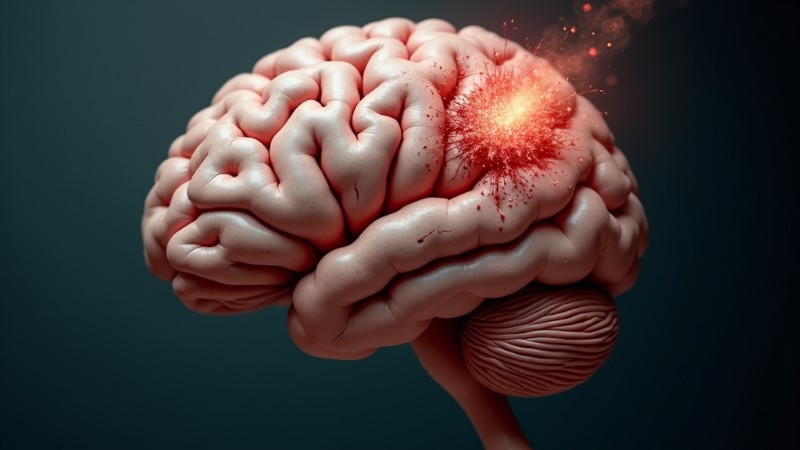Quality sleep is vital to our overall health, influencing everything from mood to immunity. Recent studies, however, are shedding light on how sleep quality in midlife may have lasting effects on brain health as we age. According to emerging research, poor sleep habits in your 40s could accelerate brain aging, leading to cognitive decline, memory issues, and increased risks of neurodegenerative conditions later in life.
Key Takeaways
Poor sleep habits in midlife may accelerate brain aging, leading to cognitive decline and increased risks of neurodegenerative conditions later in life.
- A recent study found that participants with poor sleep quality had brains 1.6-2.6 years older on average compared to those with good sleep habits.
- Poor sleep quality, trouble falling or staying asleep, and early waking were most linked to brain aging, but the study did not prove causation.
- Improving sleep quality through consistent routines, relaxation techniques, and addressing sleep disorders can help slow down brain aging and preserve cognitive function.
The findings on sleep and brain aging
A recent study published in Neurology, the medical journal of the American Academy of Neurology, has brought attention to the relationship between sleep quality in midlife and brain aging. The study tracked 589 participants, all around the age of 40 at the start, over 15 years to assess how their sleep habits affected brain health. Researchers monitored six key sleep characteristics: short sleep duration, poor sleep quality, difficulty falling asleep, trouble staying asleep, early morning awakening, and daytime sleepiness.
Participants were divided into three groups based on the number of poor sleep traits they exhibited. Around 70% fell into the low-risk category with one or no poor sleep characteristics. The middle group, comprising 22% of the participants, had two to three poor sleep traits, while the remaining 8%, categorized as high-risk, reported four to six sleep issues.
Fifteen years into the study, brain scans showed that those in the middle-risk group had brains 1.6 years older on average, while the high-risk group had an age gap of 2.6 years. Poor sleep quality, trouble falling or staying asleep, and early waking were most linked to brain aging. However, researchers noted the study shows an association, not causation, and self-reported sleep habits may not be entirely accurate.
How sleep deprivation impacts the brain
The results of the study raise important questions about how poor sleep habits may cause the brain to age faster. Dr. Shelby Harris, a clinical psychologist specializing in behavioral sleep medicine, explained that sleep plays a critical role in maintaining brain health. “When the brain ages prematurely, it can lead to a host of difficulties in daily functioning and mental clarity, significantly impacting quality of life,” she noted.
These difficulties may include memory lapses, slower cognitive processing, and an increased risk of developing neurodegenerative diseases like Alzheimer’s and dementia.
Dr. Thomas Kilkenny, Northwell Health Staten Island University Hospital’s director of the Institute of Sleep Medicine, highlighted the risks of chronic sleep deprivation. He noted that recent evidence indicates some cognitive abilities may remain impaired even after returning to adequate sleep, suggesting that sleep loss can cause lasting damage to specific brain functions. This means that while catching up on sleep may relieve some immediate symptoms, it may not fully restore long-term cognitive health.
The effects of poor sleep can extend beyond just cognitive decline. Dr. Fouzia Siddiqui, Sentara RMH Medical Center’s medical director of the sleep center, highlighted that bad sleep quality is also linked to mood disturbances like irritability and anger, which can further impact a person’s quality of life. Additionally, sleep deprivation can lead to trouble concentrating, diminished attention, and increased stress levels.
Brain shrinkage and cognitive decline
A key finding from the Neurology study involved brain shrinkage, a condition commonly associated with aging. Researchers found that participants who experienced poor sleep consistently over five years showed greater levels of brain shrinkage, which correlated with their brain scans indicating an older brain age. Brain shrinkage is often associated with cognitive decline, as it impacts the volume of key areas in the brain, particularly those responsible for memory, decision-making, and problem-solving.
“Of the sleep characteristics studied, poor sleep quality, difficulty falling asleep, and waking up too early were the most closely linked to faster brain aging,” explained Dr. Kristine Yaffe, one of the lead researchers. These specific issues are considered to disrupt the sleep cycle, preventing the brain from undergoing essential restorative processes during the night. Over time, this disruption may contribute to the shrinkage seen in participants’ brain scans.
Although these findings are significant, Yaffe and her team emphasized that their study does not definitively prove that poor sleep accelerates brain aging, but it does underline the need for further research. Future studies should aim to investigate how sleep affects brain health in younger populations and explore strategies for improving sleep quality before signs of cognitive decline emerge.
Long-term health implications
In addition to the increased risk of cognitive decline, the study suggests that poor sleep can lead to various long-term health issues. Researchers have found that middle-aged adults who experience sleep deprivation often have uncontrolled blood pressure, blood sugar, and cholesterol levels. These factors, combined with poor sleep, increase the likelihood of developing conditions such as stroke, depression, and dementia later in life.
A related study from Yale University, also published in Neurology, supports these findings. Dr. Santiago Clocchiatti-Tuozzo, who led the Yale research, concluded that poor sleep habits, alongside other unhealthy lifestyle choices in midlife, create a higher risk of serious brain health issues later on. “Our study found that making healthy lifestyle choices in middle age can have meaningful impacts on brain health later in life,” Clocchiatti-Tuozzo said.
This includes prioritizing good sleep, maintaining regular exercise, and managing diet, all of which contribute to improved cognitive function as we age.
Tips for improving sleep quality
Given the potential risks of poor sleep, experts recommend prioritizing healthy sleep habits to preserve brain health and overall well-being. Dr. Harris advises creating a consistent sleep schedule, as well as incorporating a relaxing bedtime routine. “Cut back on caffeine and alcohol before bed, try relaxation techniques, and make sure you get enough exercise,” she suggested. These small but consistent changes can help improve sleep quality, which in turn may help slow down brain aging.
Dr. Siddiqui also recommends making your sleep environment as conducive to rest as possible. This could include maintaining a cool, quiet, and dark room, as well as avoiding disruptive pre-sleep activities like using electronic devices or watching television in bed. Siddiqui further highlighted the importance of mindfulness and relaxation techniques, such as breathing exercises, meditation, or prayer, which can help calm the mind and prepare the body for a good night’s sleep.
If self-care techniques don’t work, it’s important to consult a doctor. Harris advises seeking help if sleep problems last more than two weeks. A doctor can evaluate and suggest treatments, including therapies like cognitive-behavioral therapy for insomnia (CBT-I).
More research needed
While the current findings are insightful, researchers acknowledge that more work needs to be done. One of the study’s limitations is that the participants self-reported their sleep habits, which introduces the possibility of inaccurate data. Objective measurements of sleep, such as polysomnography or actigraphy, could help future studies produce more precise results.
Researchers also stress the need to explore how sleep quality in younger populations affects brain health long-term. By understanding the mechanisms at play, interventions can be developed to help prevent or mitigate the effects of sleep deprivation before significant cognitive decline occurs.
Poor sleep in midlife is more than just an inconvenience; it can have lasting effects on brain health. The research discussed above highlights the importance of making sleep a priority in our 40s to protect cognitive function as we age. While the link between poor sleep and brain aging is still being explored, the evidence thus far underscores the need to take preventive measures early. From maintaining a consistent sleep routine to addressing sleep disorders promptly, improving sleep quality today can help safeguard our brains for the future.















